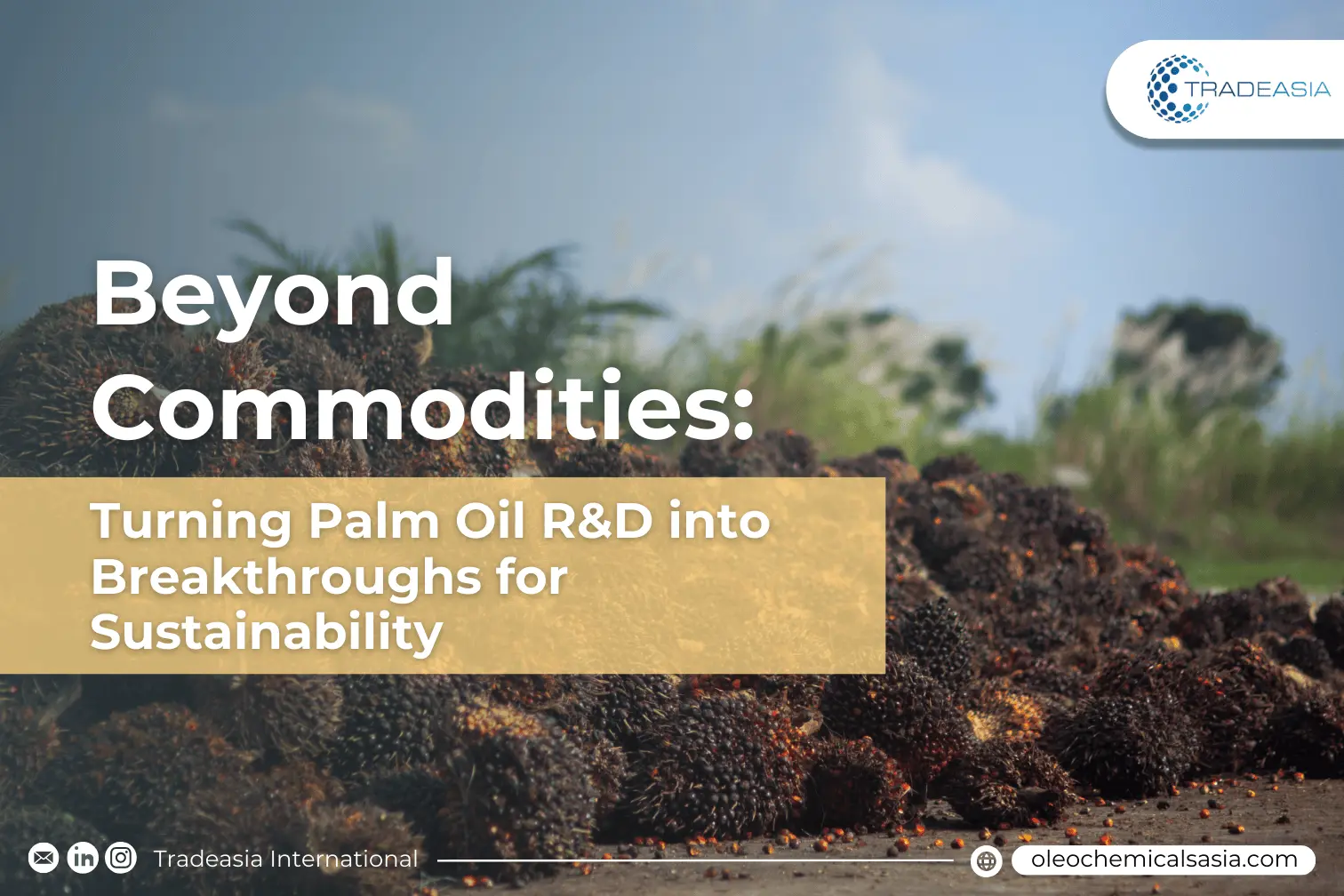Article
22 August 2025
Beyond Commodities: Turning Palm Oil R&D into Breakthroughs for Sustainability
Oleochemicals

Table of Content
- Executive Summary
- Building a Bioindustrial Future
- Palm Trading Companies as Innovators
Article
22 August 2025
Oleochemicals

Palm oil R&D is shifting the industry from commodity-based trade to sustainability-driven innovation.
Circular economy approaches are transforming waste into valuable products such as biofertilizers, renewable energy, and bioplastics.
Carbon reduction efforts, including methane capture and palm-based biofuels, are positioning palm oil in low-carbon value chains.
Palm trading companies embracing R&D can future-proof their business, build stronger market trust, and lead as sustainability pioneers.
Palm oil has long been known as a global commodity woven into countless everyday products, from food to personal care. Yet today, it is undergoing a remarkable transformation. No longer viewed merely as an economic powerhouse, palm oil is increasingly recognized as a platform for innovation and sustainability. Through advanced research and development (R&D), this industry is redefining itself—offering a chance for palm trading companies to move beyond traditional roles and position themselves as leaders in sustainable business with science-driven solutions.
Central to this transformation is the application of circular economy principles, where efficiency and waste minimization drive new opportunities. Palm oil production generates large volumes of biomass residues, including empty fruit bunches, fronds, and palm kernel shells. In the past, these were often discarded or used in low-value ways. Today, cutting-edge R&D is valorizing these byproducts, turning them into biofertilizers, renewable energy, and even bioplastics.
The implications of this shift are profound. Biofertilizers derived from palm residues not only restore soil health but also reduce reliance on chemical inputs, which can be costly and environmentally damaging. This waste-to-value approach demonstrates how sustainability and profitability are no longer opposing goals but part of the same strategy. For palm companies, adopting circular solutions means lowering environmental impact while opening new revenue streams.
Climate change remains one of the greatest challenges of our time, and palm oil R&D is directly tackling the issue. Innovative methods are being applied to reduce carbon emissions across the supply chain, from plantation to processing. For example, capturing methane from palm oil mill effluent prevents powerful greenhouse gases from entering the atmosphere, while precision agriculture—enhanced by AI and data analytics—helps optimize resource use and cut emissions.
Beyond agriculture, palm oil is also proving to be a valuable raw material for green alternatives. Palm-based biofuels and biochemicals are being developed as substitutes for fossil-derived products, providing cleaner options for transportation and industry. These advancements are positioning palm oil not just as an agricultural product but as an essential contributor to low-carbon value chains. For palm trading companies, such innovations are key to meeting stricter regulations while solidifying their role as pioneers in climate-smart production.
The future potential of palm oil extends even further through waste-to-value technologies. By tapping into advanced processes, palm residues can be transformed into bioethanol, specialty chemicals, and bioplastics. Microbial and enzymatic technologies are unlocking the hidden potential of lignocellulosic biomass, creating the foundation for a sustainable bioindustrial ecosystem.
This progress is not achieved in isolation. It requires collaboration between chemistry, biotechnology, and environmental science. By embracing interdisciplinary R&D, palm oil companies can create a new model where operations actively contribute to sustainable development. This not only reduces reliance on virgin resources but also reshapes palm oil’s image—from a commodity with environmental challenges to a driver of green industrial innovation.
For palm trading companies, this transformation offers more than just operational improvements—it provides a powerful narrative for the future. By championing innovation, they can differentiate themselves in the marketplace, build trust among stakeholders, and access premium markets where sustainability is highly valued.
Leading companies are already investing in innovation hubs and forging partnerships with universities and startups to accelerate breakthroughs. This shift marks a decisive move away from the commodity trap, demonstrating that palm oil can evolve from a bulk-traded product into a key enabler of sustainable growth and resilient livelihoods.
Palm oil’s future lies beyond its traditional role as a commodity. Through R&D that emphasizes circular economy principles, carbon reduction, and waste-to-value technologies, the industry is transforming into a cornerstone of sustainable innovation. Palm trading companies that embrace this change will not only secure their competitive edge but also lead the way toward a more resilient and responsible palm oil sector. In doing so, they turn palm oil into more than just a commodity—it becomes a breakthrough for sustainability in practice.
We're committed to your privacy. Tradeasia uses the information you provide to us to contact you about our relevant content, products, and services. For more information, check out our privacy policy.
Leave a Comment